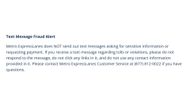Drivers using the FasTrak lanes have now become a target of fraudsters. The hackers send a text message to the lane users which, at first glance, might look convincing. However, the message is not exclusive to the lane users as drivers who do not use the lanes have also received this message. As per reports, this fraudulent practice started over the summer.
The message instructs drivers to pay the required fee for using the lane. It also warns of legal action for those who fail to do so. This practice is a cyberattack called phishing which tricks victims into paying money to unauthorized accounts via messages containing unverified links. This practice uses fraudulent email IDs and counterfeit websites to meet the hackers’ goals.
Metro Express FasTrak lanes are used by drivers and riders who want to dodge Los Angeles’ traffic jams. Screenshots of the messages that have circulated on social media platforms read:
“Please pay for FastTrak Lane on December 22, 2024. In order to avoid excessive late fees and potential legal action on the bill, please pay the fee in time. Thank you for your cooperation and wish you a happy holiday.”
The message comes with a link that gets activated after the receiver replies ‘Y.’ Metro has also released a pop-up warning on its website warning users not to respond to such messages. The warning states:
“Metro ExpressLanes does NOT send out text messages asking for sensitive information or requesting payment. If you receive a text message regarding tolls or violations, please do not respond to the message, do not click any links in it, and do not use any contact information provided in it. Please contact Metro ExpressLanes Customer Service at (877) 812-0022 if you have questions.”

Metro said the express lane systems like FasTrak were not hacked
According to a report by KCAL News, Metro also released a system saying that the express lanes system has not been hacked. There were no breaches or compromises to customer information.
More than 340 million people have used the FasTrak lanes since November 2024. The recent scam can be attributed to the growing popularity of the express lane. A report by CBS 8 San Diego mentions that if one receives such messages, they must log in to their FasTrak account or contact the authorities to verify the message.
Besides that, one can delete the text and file a complaint with the FBI, the Federal Trade Commission, and the Attorney General’s office. Individuals must secure their personal information and financial accounts in case they have accidentally clicked on any of these suspicious links or shared any valuable information.
These messages come from different phone numbers. However, when one blocks the number, the scammers send these phishing texts from other numbers. During the summer, the Attorney General of California issued a consumer alert warning people about these text-based toll charge scams.
The scams had targeted drivers across different regions, including San Francisco in March, Sonoma County in April, and San Diego in July, this year.
